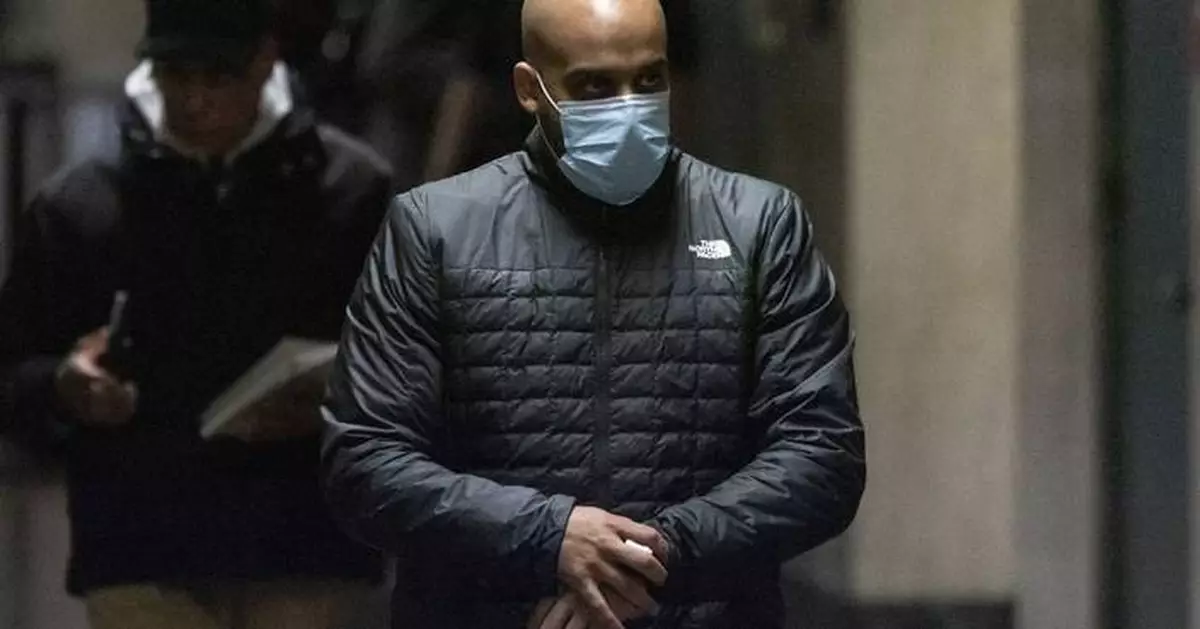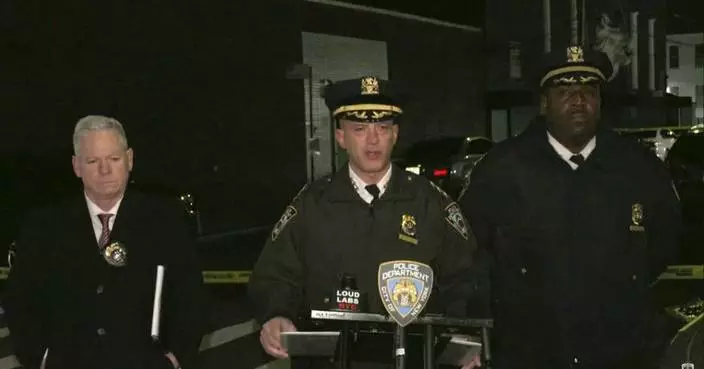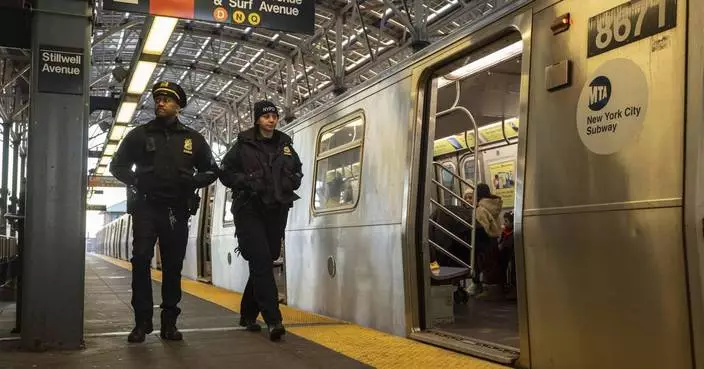NEW YORK (AP) — A subway commuter who helped an ex-Marine restrain an agitated man aboard a Manhattan subway last year testified Tuesday that he tried to convince the veteran to loosen his grip around the man’s neck.
In a New York City courtroom, Eric Gonzalez recalled encountering the chaotic struggle in progress, after Daniel Penny had already pinned the man, Jordan Neely, to the train's floor and placed him in a firm chokehold.
Click to Gallery
Daniel Penny arrives at the court after break in New York, Tuesday, Nov. 12, 2024. (AP Photo/Yuki Iwamura)
Daniel Penny exits a courtroom for a lunch break in New York, Tuesday, Nov. 12, 2024. (AP Photo/Yuki Iwamura)
Daniel Penny arrives at the court after break in New York, Tuesday, Nov. 12, 2024. (AP Photo/Yuki Iwamura)
Eric Gonzalez is seen at Manhattan criminal court in New York, Tuesday, Nov. 12, 2024. (AP Photo/Yuki Iwamura)
Daniel Penny arrives at the court after break in New York, Tuesday, Nov. 12, 2024. (AP Photo/Yuki Iwamura)
Eric Gonzalez is seen at Manhattan criminal court in New York, Tuesday, Nov. 12, 2024. (AP Photo/Yuki Iwamura)
“I made my presence known to Daniel Penny,” Gonzalez told jurors. “I said, ‘I’m going to grab his hands so you can let go.’”
Penny is facing manslaughter charges in the May 2023 death of Neely, a 30-year-old man who was homeless. Prosecutors say Penny acted with "indifference" to Neely's life by keeping him in a chokehold for nearly six minutes.
Penny's defense attorneys, meanwhile, say their client was seeking to protect himself and fellow riders from a “seething, psychotic” person who had shouted at riders and made distressing statements about wanting to die prior to Penny's intervention.
But Gonzalez, a casino manager and daily subway rider, hadn’t known any of that when he “jumped in to help,” he revealed Tuesday. Rather, he said he wanted to diffuse the situation by giving Penny an “alternative” to continuing to choke Neely. He recalled telling Penny: “Let him go, get your arm away from his neck.”
Jurors were then shown slowed-down video of the altercation, in which Gonzalez appeared to mouth something to Penny. As Penny continued to choke Neely, Gonzalez kept hold of Neely’s arms and wrist.
“Jordan Neely’s body goes limp and I let go and shortly after Daniel Penny lets go,” Gonzalez added. He checked the man’s pulse and tried to place him in a “recovery position," he said, before leaving the scene.
In their cross-examination, defense attorneys sought to cast doubt on the narrative of the bystander-turned-participant, noting his testimony was coming weeks after Gonzalez learned that prosecutors did not plan to charge him for his involvement in the struggle.
They also noted that Gonzalez’s story had changed over time: he initially told prosecutors that Neely had attacked him, though surveillance footage showed he was not on the train at the start of the confrontation.
“I was trying to justify my actions for having my hands on him,” Gonzalez admitted on Tuesday.
In court Tuesday, Penny sat straight up, staring forward as the video played. Members of Neely’s family sat near the front of the gallery, including his father, who hung his head for much of the proceeding.
The trial has placed a spotlight on issues of public safety and disorder within the city’s transit system. The case has divided many New Yorkers, often along political lines. Penny, who is white, has become a cause célèbre on the right; Neely, who was Black, is frequently mentioned at the city's racial justice protests, some of which have taken place just outside the lower Manhattan courthouse.
On Tuesday, Gonzalez said he was aware of the public attention around the case and feared he could face “public prosecution” for his testimony.
“There’s all these protests going on, I’m scared for myself, I’m scared for my family,” he said.

Daniel Penny arrives at the court after break in New York, Tuesday, Nov. 12, 2024. (AP Photo/Yuki Iwamura)
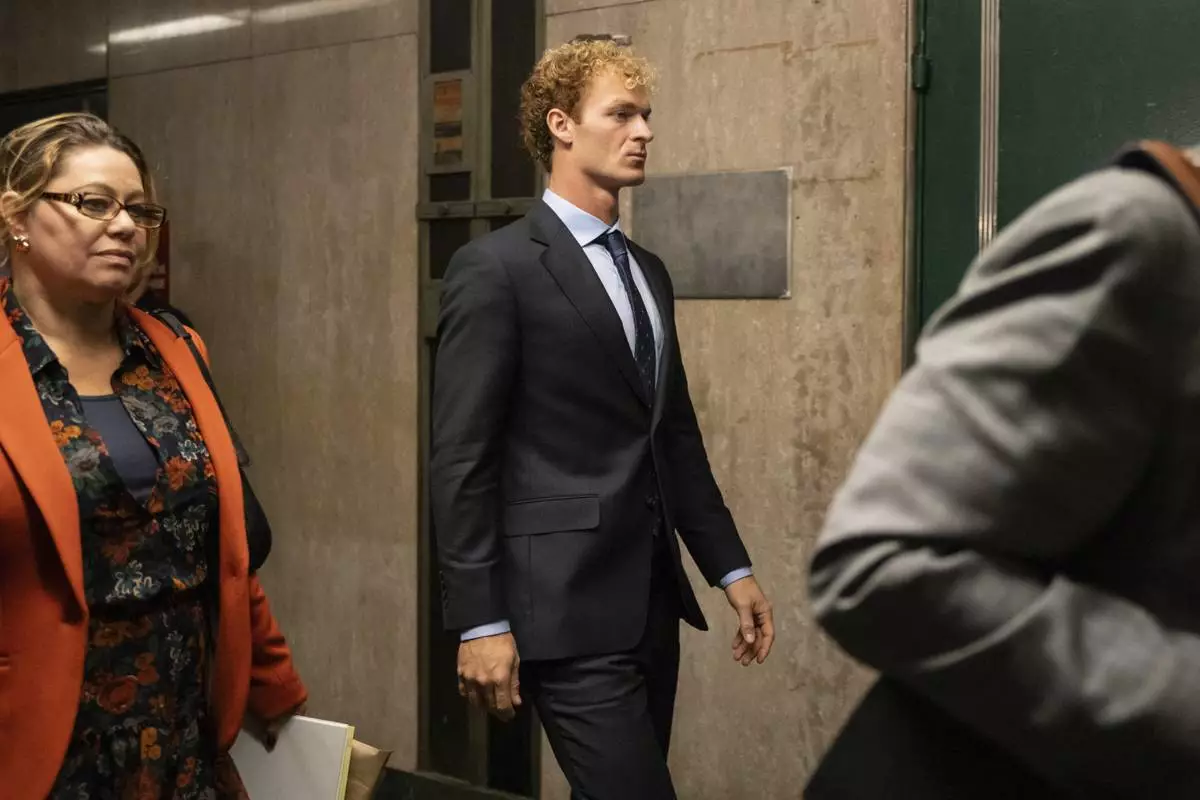
Daniel Penny exits a courtroom for a lunch break in New York, Tuesday, Nov. 12, 2024. (AP Photo/Yuki Iwamura)

Daniel Penny arrives at the court after break in New York, Tuesday, Nov. 12, 2024. (AP Photo/Yuki Iwamura)
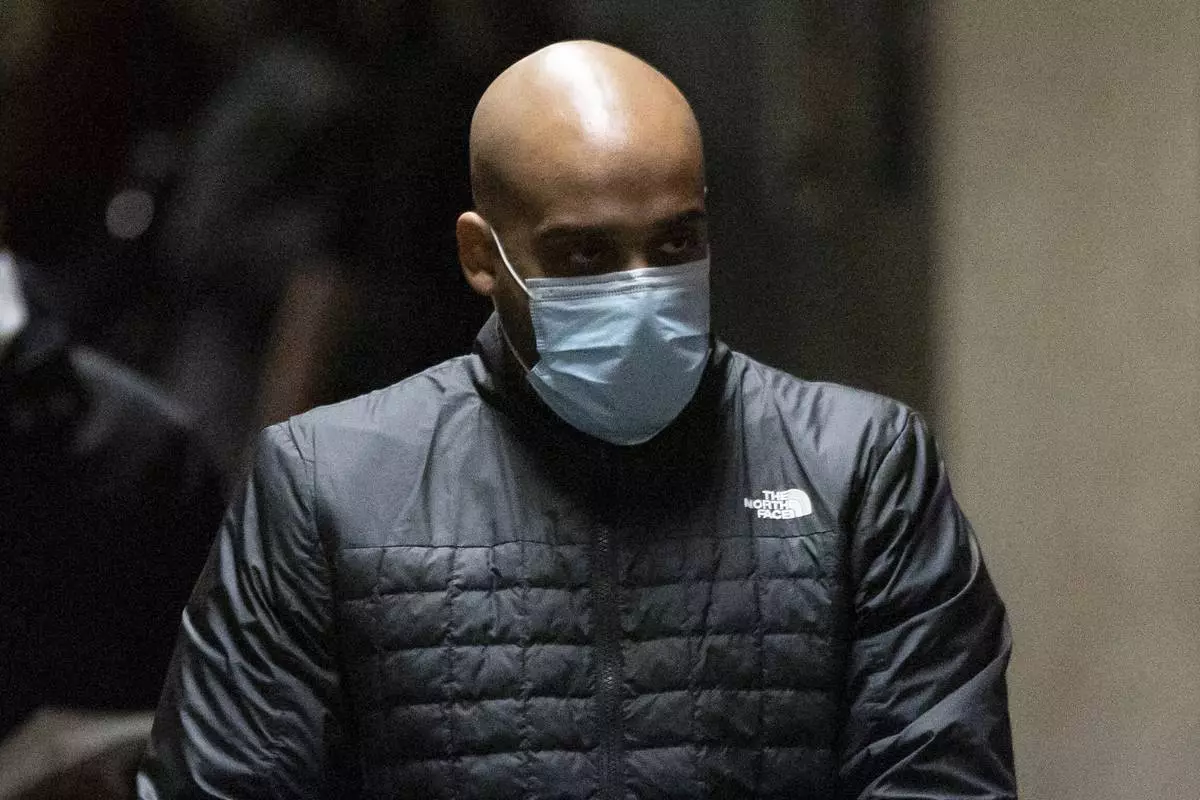
Eric Gonzalez is seen at Manhattan criminal court in New York, Tuesday, Nov. 12, 2024. (AP Photo/Yuki Iwamura)

Daniel Penny arrives at the court after break in New York, Tuesday, Nov. 12, 2024. (AP Photo/Yuki Iwamura)
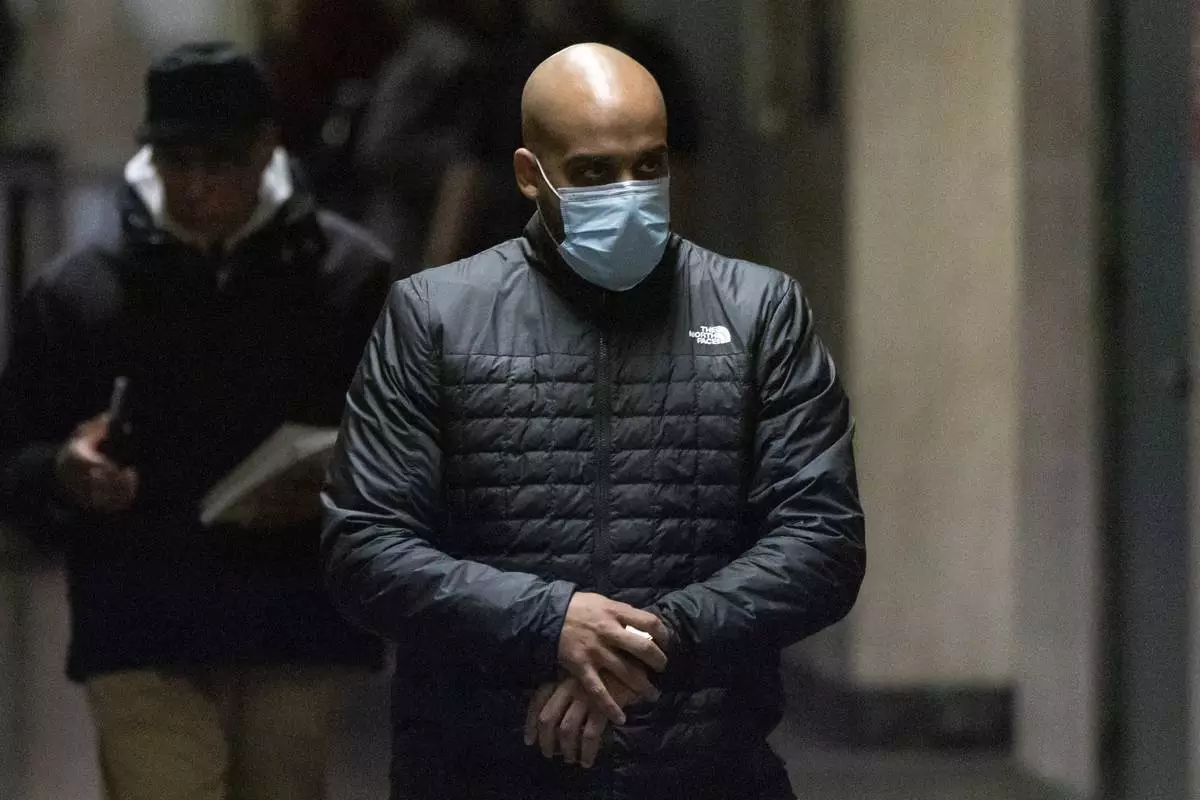
Eric Gonzalez is seen at Manhattan criminal court in New York, Tuesday, Nov. 12, 2024. (AP Photo/Yuki Iwamura)
NEW ORLEANS (AP) — The FBI now says the New Orleans truck attacker acted alone in an “act of terrorism” when he drove a pickup truck into a crowd of New Year’s revelers early Wednesday, killing 14 people. The driver had posted videos on social media hours before the carnage saying he was inspired by the Islamic State group and expressing a desire to kill, President Joe Biden said.
The FBI identified the driver as 42-year-old Shamsud-Din Bahar Jabbar.
Officials have not yet released the names of the people killed in the attack, but their families and friends have started sharing their stories. About 30 people were injured.
Here is the latest:
Crowds are already flocking to the Caesars Superdome ahead of the Sugar Bowl. Alongside food trucks and foot traffic, a fleet of armored vehicles maintains a watchful presence.
Heaven Sensky-Kirsch says her father, Jeremi Sensky, endured 10 hours of surgery for injuries from the truck attack that included two broken legs. He was taken off a ventilator Thursday.
Jeremi Sensky was ejected from the wheelchair he has used since a 1999 car accident and had bruises to his face and head, Sensky-Kirsch said in a phone interview with The Associated Press.
Sensky, 51, had driven from his home in Canonsburg, Pennsylvania, to New Orleans to celebrate the holiday.
He and his wife, his daughter, his son-in-law and two friends stopped for a few days in Nashville before arriving in New Orleans.
Before the attack, Sensky and the two friends had been having pizza, his daughter said. Sensky left them to return to his hotel on Canal Street because he felt cold, she said.
Sensky-Kirsch said others could see the attacker coming and were able to run out of the way, but her father “was stuck on the road.”
When he didn’t return to the hotel, they went to look for him, ending up in an emergency room, she said.
“We thought he was dead,” Sensky-Kirsch said. “We can’t believe he’s alive.”
As New Orleans approaches the start of its carnival season on Monday, a monthslong period leading up to Mardi Gras, the city normally celebrates with parades and king cake.
But Kim Do, 47, whose Hi-Do bakery is a beloved supplier of the carnival treat, says she worries that orders for the biggest moneymaker of her family-run business will be significantly down.
“The mood in the city, we feel it today, I don’t know how we’re going to move forward after this tragedy,” Do said.
“I personally would be scared to even go out there, to be in the parades — I think there’s going to be a lot less people, a lot less activities,” she said. “I think the city will try to go back to the normal stuff as much as possible but I think we’re all going to be a little more cautious.”
Fifteen people were killed in the attack, said Christopher Raia, deputy assistant director of the FBI’s counter-terrorism division. That number includes the 14 victims killed plus the assailant, Shamsud-Din Jabbar.
“We know that he specifically picked out Bourbon Street, not sure why,” said Christopher Raia, deputy assistant director of the FBI’s counterterrorism division.
“He was 100 percent inspired by ISIS,” he added.
“The city of New Orleans, we’re resilient,” New Orleans Mayor Latoya Cantrell said.
“The confidence is there to reopen Bourbon Street to the public before game time today,” Cantrell added.
The FBI obtained surveillance video of Shamsud Din Jabbar placing the explosive devices where they were found, said Christopher Raia, deputy assistant director of the FBI’s counter-terrorism division.
The FBI also found “no definitive link” between the New Orleans attack and the Tesla Cybertruck explosion outside a Trump hotel in Las Vegas.
The FBI has received more than 400 tips from the public, some from New Orleans and others from other states, Christopher Raia, deputy assistant director of the FBI’s counter-terrorism division, said at a news conference on Thursday.
U.S. President Joe Biden said Wednesday evening the FBI was looking into whether an explosion outside a Las Vegas hotel owned by President-elect Donald Trump was connected to the New Orleans attack.
Fireworks and camp fuel canisters were found in a Tesla Cybertruck that blew up outside the Trump International Hotel early Wednesday, killing a suspect inside the vehicle.
The person who died in the explosion was an active-duty U.S. Army soldier who spent time at the base formerly known as Fort Bragg, three U.S. officials told The Associated Press on Thursday. The officials also spoke on the condition of anonymity because they were not authorized to disclose details of his service.
The truck explosion came hours after a driver, 42-year-old Shamsud-Din Bahar Jabbar, rammed a truck into a crowd in New Orleans. Jabbar, a U.S. Army veteran, also spent time at Fort Bragg, a massive Army base in North Carolina that is home to Army special forces command. An official told the AP that there is no apparent overlap in their assignments there.
The investigation so far has not shown the incidents are related, and authorities don’t think the men knew each other, two law enforcement officials said. The officials were not authorized to discuss details of the investigation publicly and spoke on condition of anonymity.
▶ Read more about the Las Vegas Cybertruck explosion
The FBI says it recovered the black banner of the Islamic State group from the truck that smashed into New Year’s partygoers. The investigation is expected to look in part at any support or inspiration that driver Shamsud-Din Jabbar may have drawn from that violent Middle East-based group or from any of at least 19 affiliated groups around the world.
Routed from its self-proclaimed caliphate in Syria and Iraq by a U.S. military-led coalition more than five years ago, IS has focused on seizing territory in the Middle East more than on staging massive al-Qaida-style attacks on the West.
But in its home territory, IS has welcomed any chance to behead Americans and other foreigners who come within its reach. The main group at peak strength claimed a handful of coordinated operations targeting the West, including a 2015 Paris plot that killed 130 people. It has had success, although abated in recent years, in inspiring people around the world who are drawn to its ideology to carry out ghastly attacks on innocent civilians.
▶ Read more about IS and what attacks it has inspired
Louisiana Governor Jeff Landry will be joined at the news conference by officials from the FBI, the Bureau of Alcohol, Tobacco, Firearms and Explosives, the U.S. Attorney’s Office, the Louisiana State Police and the New Orleans Police Department.
The conference is scheduled to begin around 10:15 a.m. CST.
“The Superdome is completely secure,” Louisiana Gov. Jeff Landry said on Fox News. “Again, the FBI continues to pour resources into the state.”
Landry said he plans to attend Thursday afternoon’s college football playoff game between the University of Georgia and the University of Notre Dame.
“We need not let fear paralyze us,” Landry added. “That’s the problem in this country. When we do that, the terrorists win.”
ROME — A telegram of condolences, addressed to Archbishop Gregory Aymond, said Francis was saddened to learn of the attack in New Orleans and was spiritually close to the city.
Francis “prays for healing and consolation of the injured and bereaved,” said the telegram, which was signed by the Vatican secretary of state, Cardinal Pietro Parolin.
Separately, Italian President Sergio Mattarella also sent condolences to President Joe Biden, whom he will see during Biden’s visit to Rome next week, saying all of Italy was mourning the loss of life.
“At this time of sorrow for the American people, I would like to reaffirm the firm resolve of the Italian Republic to oppose in the strongest terms all forms of terrorism, on the basis of those values of civilization, democracy and respect for human life that have always been shared with the United States,” he said in a statement.
The College Football Playoff quarterfinal at the Sugar Bowl between Georgia and Notre Dame was postponed by a day because of the truck attack, which unfolded about a mile away.
The game, originally scheduled for 7:45 p.m. CST at the 70,000-seat Superdome on Wednesday, was pushed back to 3 p.m. Thursday. The winner advances to the Jan. 9 Orange Bowl against Penn State.
“Public safety is paramount,” Sugar Bowl CEO Jeff Hundley said at a media briefing alongside federal, state and local officials, including Louisiana Gov. Jeff Landry and New Orleans Mayor LaToya Cantrell. “All parties all agree that it’s in the best interest of everybody and public safety that we postpone the game.”
The decision to postpone the game meant numerous traveling fans with tickets would not be able to attend. Ticket prices online plummeted in some cases to less than $25 as fans with plans to depart on Thursday tried to unload them.
The Superdome was on lockdown for security sweeps on Wednesday morning. Both teams spent most of the day in their hotels, holding meetings in ballrooms.
▶ Read more about the decision to postpone the Sugar Bowl
Officials have not yet released the names of the 15 people killed in the New Orleans New Year’s Day truck attack, but their families and friends have started sharing their stories.
Here’s a look at some of what we know:
▶ Read more about the victims of the New Orleans truck attack
Authorities say the driver of a pickup truck sped through a crowd of pedestrians gathered in New Orleans’ bustling French Quarter district early on New Year’s Day, killing at least 15 people and injuring about 30 others. The suspect was killed in a shootout with police.
The FBI is investigating the attack as an act of terrorism and said it does not believe the driver acted alone.
Wednesday’s attack unfolded on Bourbon Street, known worldwide as one of the largest destinations for New Year’s Eve parties. Large crowds had also gathered in the city ahead of the College Football Playoff quarterfinal at the Sugar Bowl, which had been scheduled for later Wednesday at the nearby Superdome. The game was postponed until Thursday afternoon following the attack.
▶ Catch up on what we know about the New Orleans truck attack
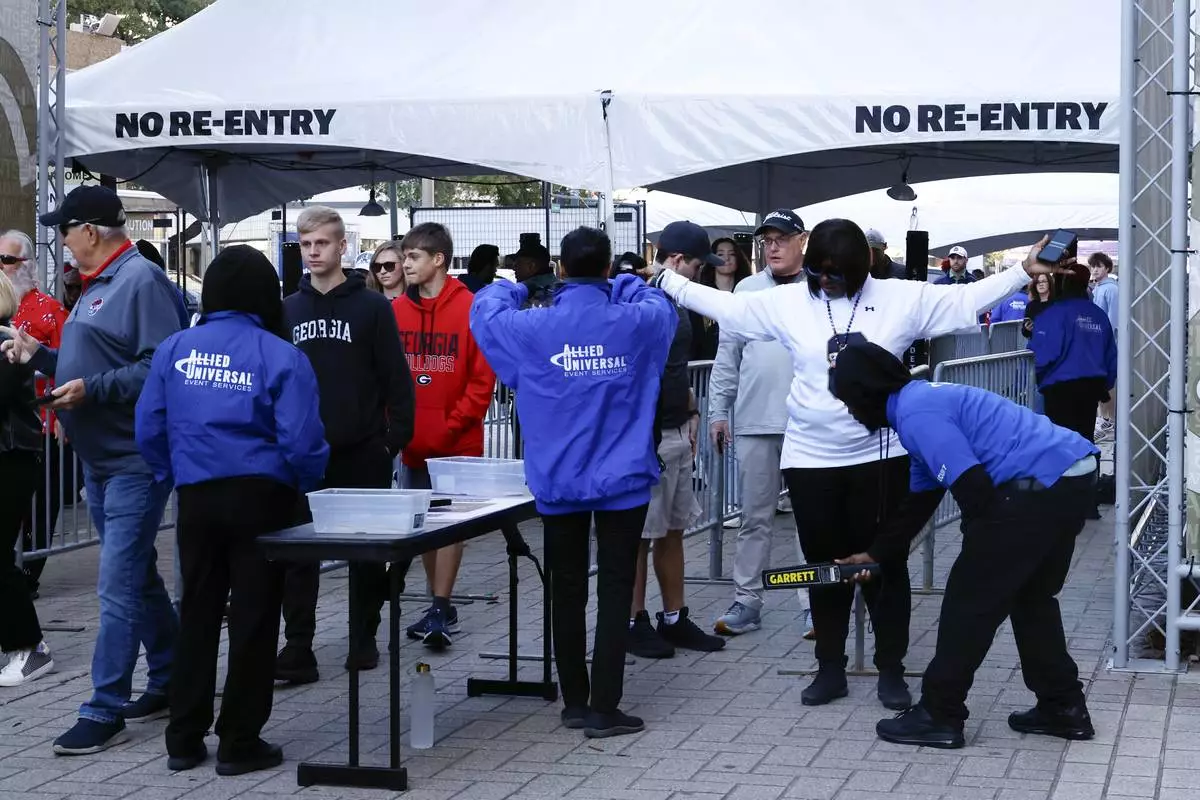
Fans pass through security check points as they enter the Caesars Superdome fan zone ahead of the Sugar Bowl NCAA College Football Playoff game, Thursday, Jan. 2, 2025, in New Orleans. (AP Photo/Butch Dill)

Street view of Superdome ahead of the Sugar Bowl NCAA College Football Playoff game, Thursday, Jan. 2, 2025, in New Orleans. (AP Photo/Butch Dill)

Fans pass through security check points as they enter the Superdome fan zone ahead of the Sugar Bowl NCAA College Football Playoff game, Thursday, Jan. 2, 2025, in New Orleans. (AP Photo/Butch Dill)

Security and bomb sniffing dogs check vehicles as they enter the Superdome parking garage ahead of the Sugar Bowl NCAA College Football Playoff game, Thursday, Jan. 2, 2025, in New Orleans. (AP Photo/Butch Dill)
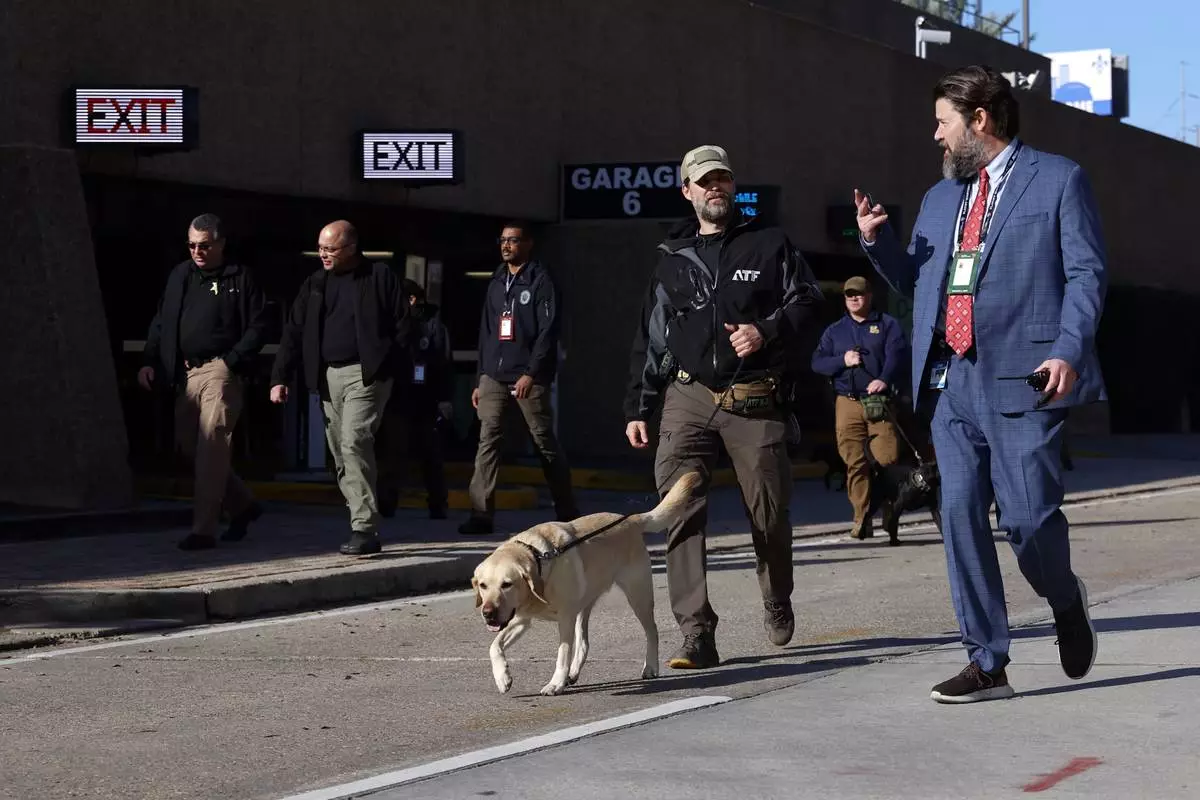
Security with bomb sniffing dogs patrol the area around the Superdome ahead of the Sugar Bowl NCAA College Football Playoff game, Thursday, Jan. 2, 2025, in New Orleans. (AP Photo/Butch Dill)

Military personnel walk down Bourbon street, Thursday, Jan. 2, 2025 in New Orleans. (AP Photo/George Walker IV)

A state trooper stands by New Orleans' Canal and Bourbon streets, Thursday, Jan. 2, 2025. (AP Photo/George Walker IV)

EDS NOTE: GRAPHIC CONTENT - Emergency personnel work the scene on Bourbon Street after a vehicle drove into a crowd on New Orleans' Canal and Bourbon Street, Wednesday Jan. 1, 2025. (AP Photo/Gerald Herbert)

The FBI investigates the area on Orleans St and Bourbon Street by St. Louis Cathedral in the French Quarter where a suspicious package was detonated after a person drove a truck into a crowd earlier on Bourbon Street on Wednesday, Jan. 1, 2025. (AP Photo/Matthew Hinton)
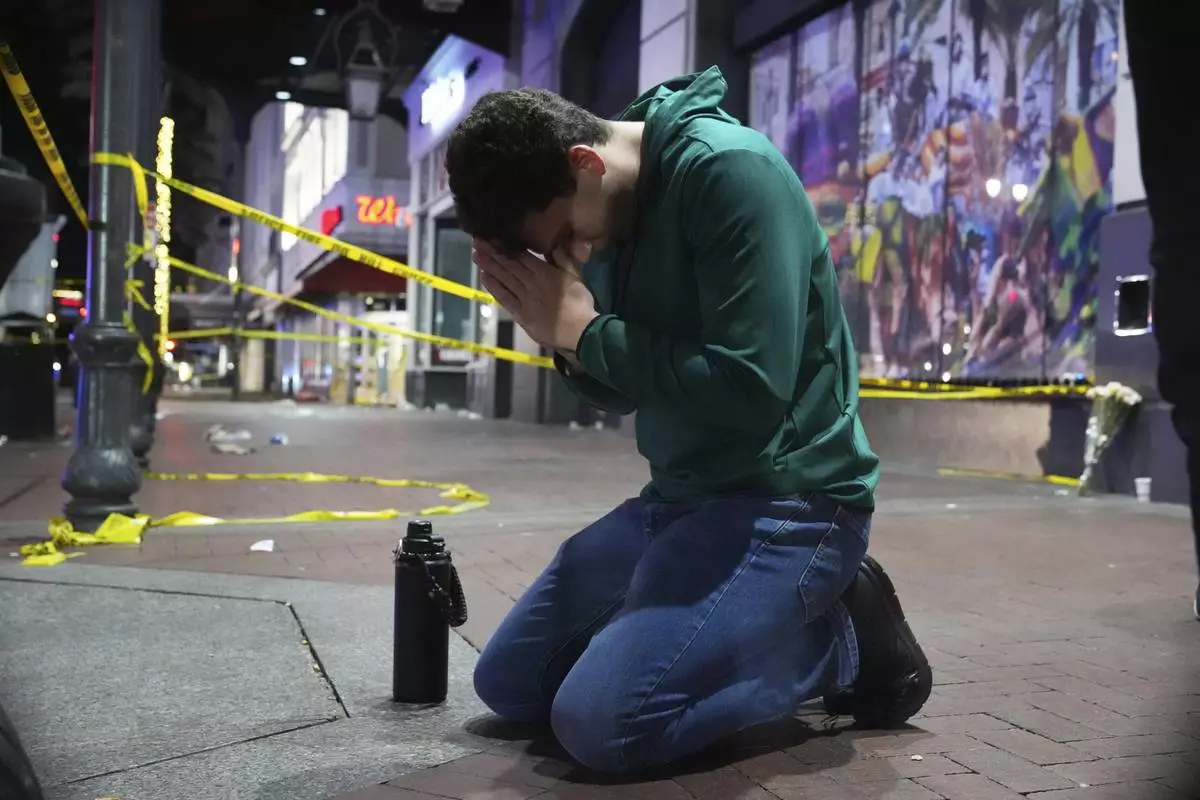
Matthias Hauswirth of New Orleans prays on the street near the scene where a vehicle drove into a crowd on New Orleans' Canal and Bourbon streets, Wednesday, Jan. 1, 2025. (AP Photo/George Walker IV)
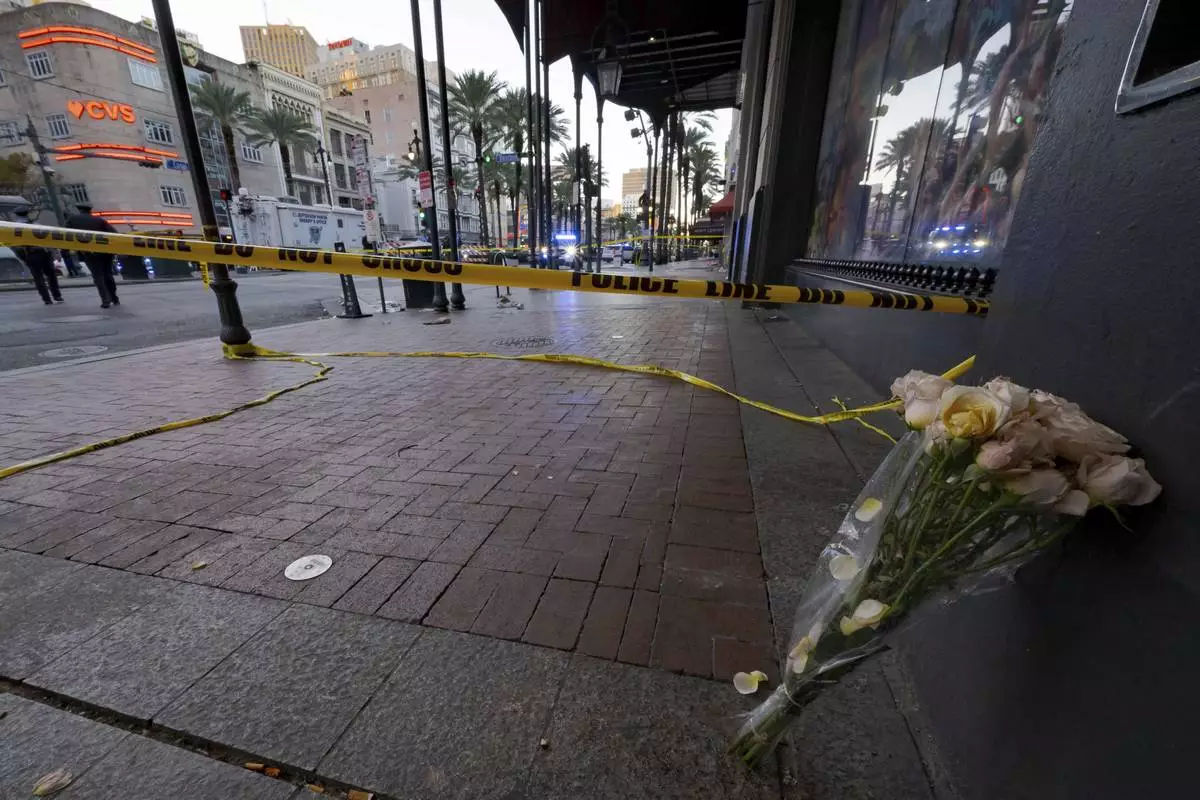
A bouquet of flowers stands at the intersection of Bourbon Street and Canal Street during the investigation after a pickup truck rammed into a crowd of revelers early on New Year's Day, Wednesday, Jan. 1, 2025, in New Orleans. (AP Photo/Matthew Hinton)

An officer walks along Conti Street after a vehicle drove into a crowd on New Orleans' Canal and Bourbon streets, Wednesday, Jan. 1, 2025. (AP Photo/George Walker IV)
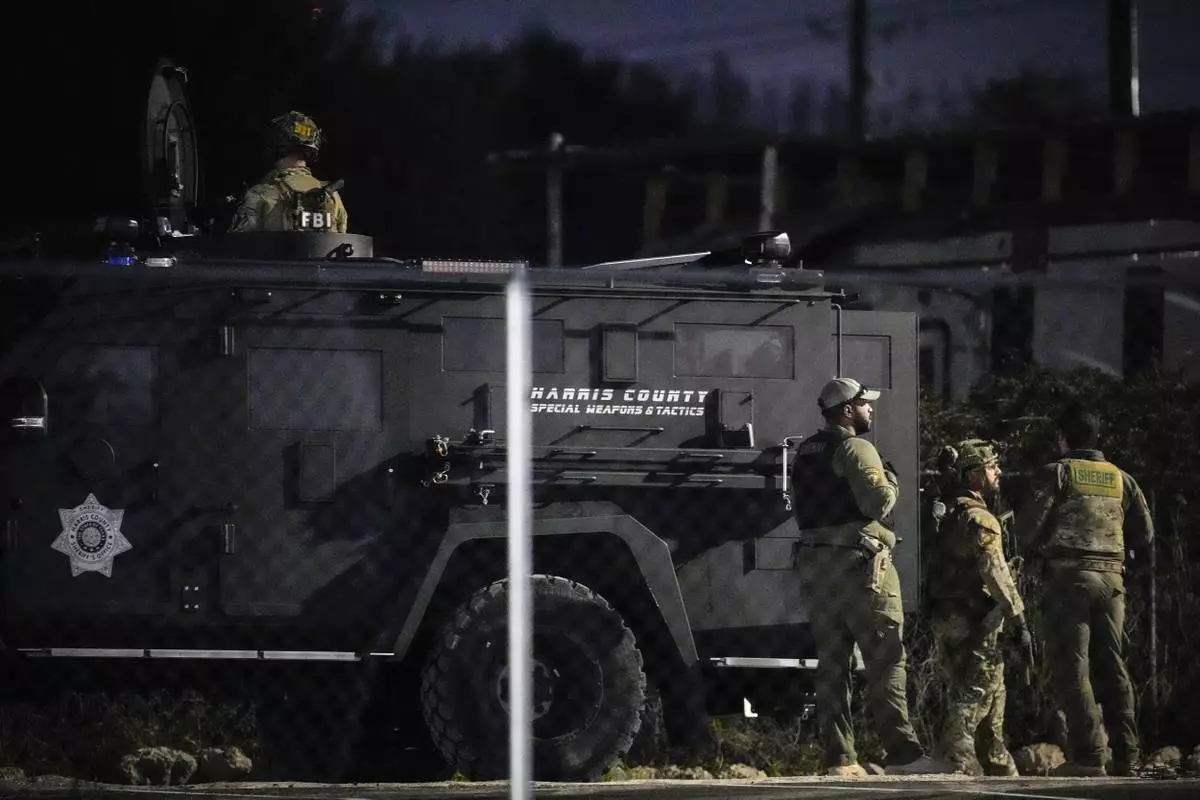
Law enforcement officers stand behind a SWAT vehicle near a location in Houston, Texas, Wednesday, Jan. 1, 2025, where police personnel investigate the place suspected to be associated with an attacker in a deadly rampage in New Orleans. (Brett Coomer/Houston Chronicle via AP)

Investigators work the scene after a person drove a vehicle into a crowd earlier on Canal and Bourbon Street in New Orleans, Wednesday, Jan. 1, 2025. (AP Photo/Gerald Herbert)
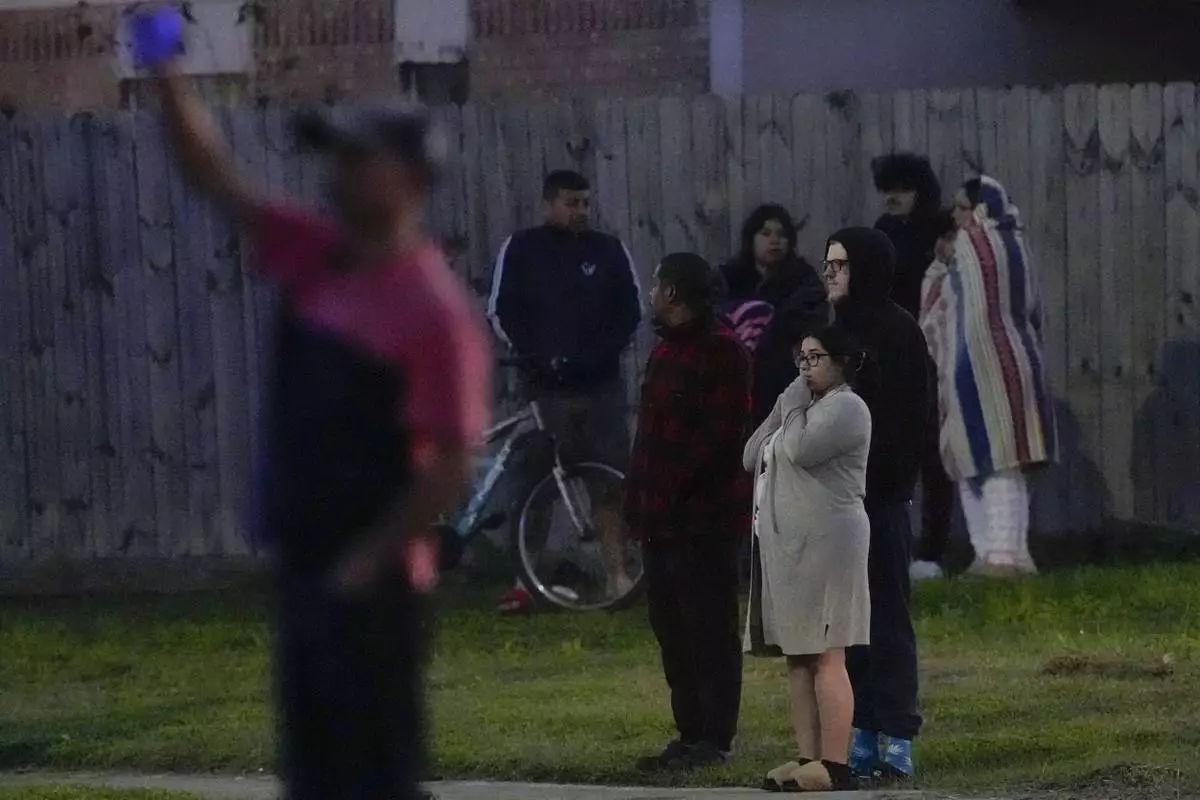
Neighbors stand and watch outside the police lines surrounding a location in Houston, Texas, Wednesday, Jan. 1, 2025, where police personnel investigate the place suspected to be associated with an attacker in a deadly rampage in New Orleans. (Brett Coomer/Houston Chronicle via AP)

Police officers stand near the scene where a vehicle drove into a crowd on New Orleans' Canal and Bourbon streets, Wednesday, Jan. 1, 2025. (AP Photo/George Walker IV)
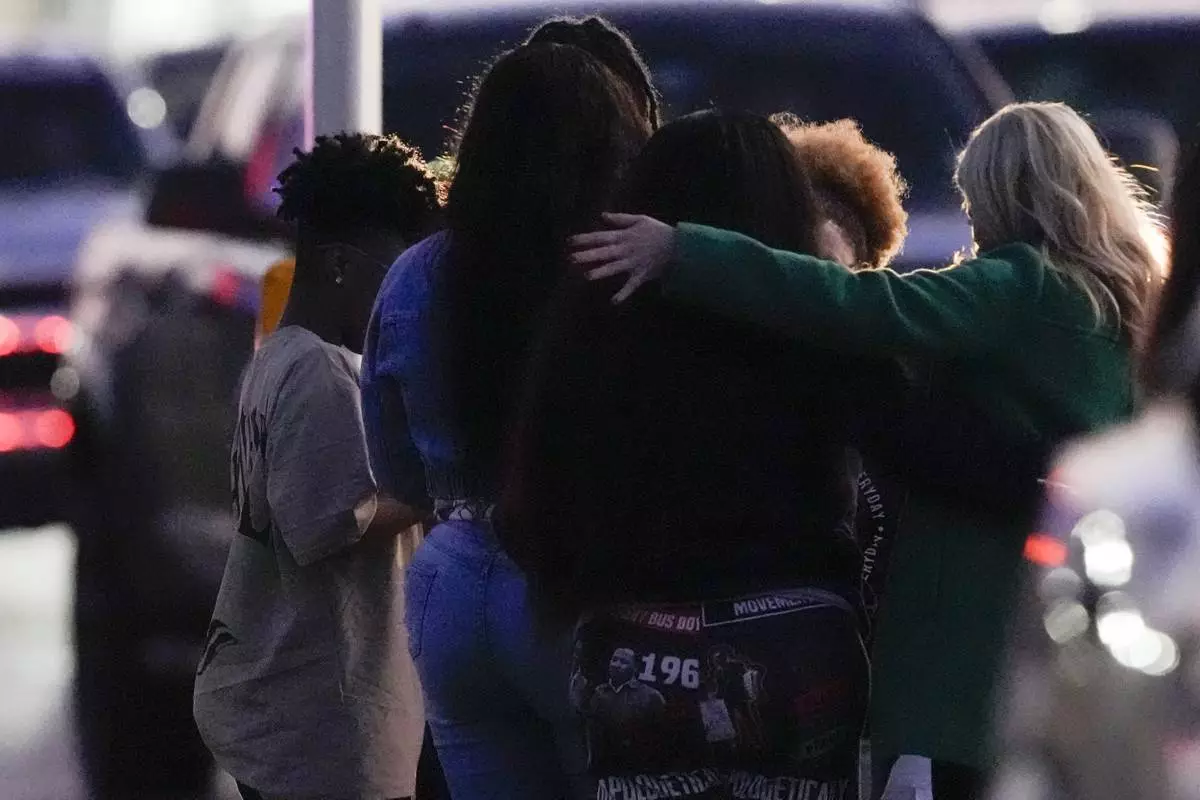
Neighbors embrace as they stand outside the police lines surrounding a location in Houston, Texas, Wednesday, Jan. 1, 2025, where police personnel investigate the place suspected to be associated with an attacker in a deadly rampage in New Orleans. (Brett Coomer/Houston Chronicle via AP)








